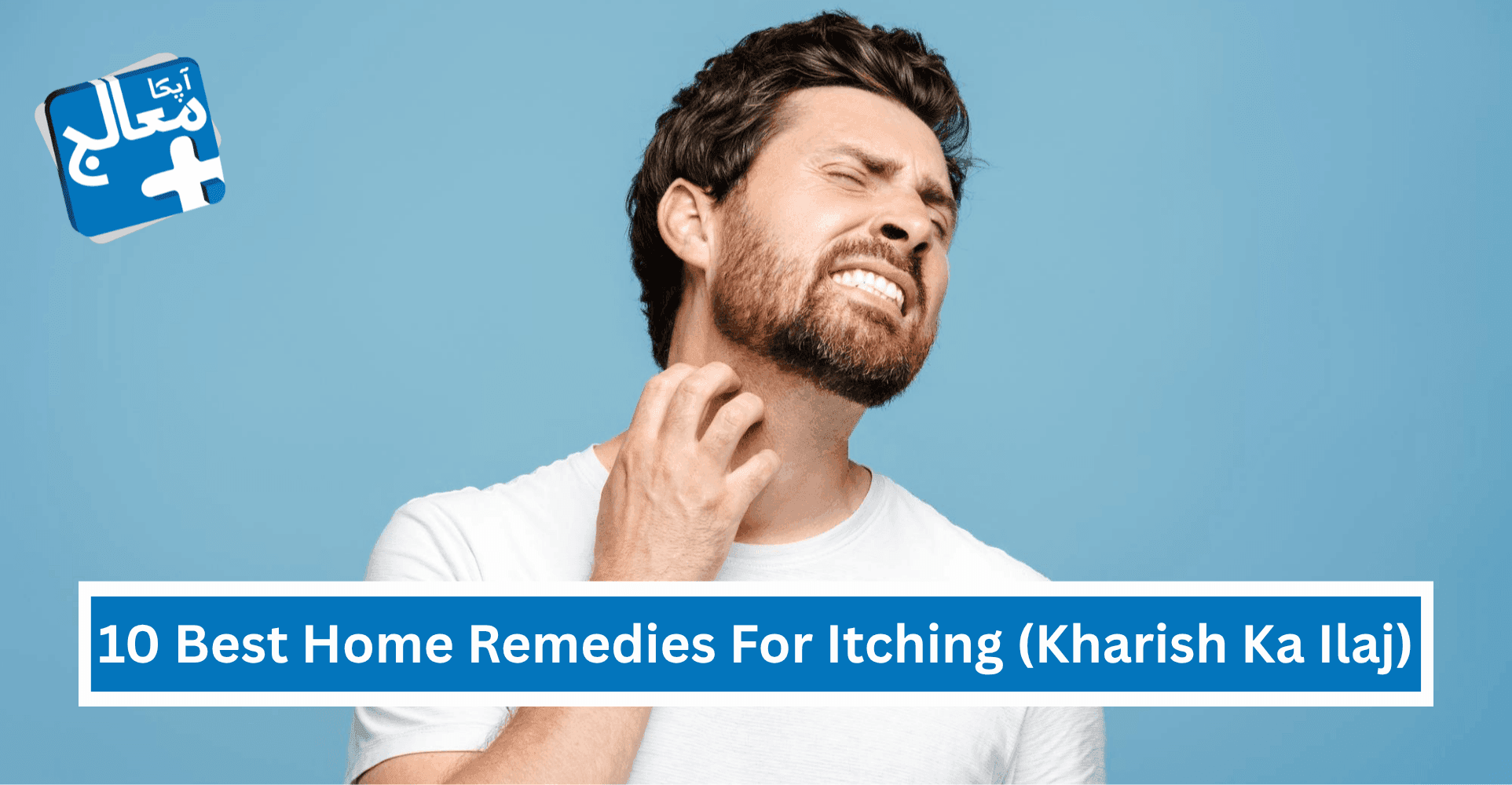10 Best Home Remedies For Itching (Kharish Ka Ilaj) – Natural Relief At Home

Itching, or kharish, is a sensation that makes you repeatedly scratch your skin. There can be many causes for it, including skin dryness, allergies, insect bites, skin conditions such as eczema and psoriasis, or infections. It can also occur when a wound is healing after a burn or cut. If the itching becomes very severe or lasts for a long time, you should seek medical consultation.
However, today in this blog, we will discuss some natural home remedies that can provide you with instant relief from mild to moderate types of itching.
In this blog, let's dive in to find the top 10 Best Home Remedies for Itching (Kharish Ka Ilaj)
What is Itching?
Itching or Kharish, in medical terminology, is called pruritus. Pruritus is generally a harmless and temporary condition that can affect any area of the body. It refers to an uncomfortable, irritating sensation that creates a strong urge to scratch the skin.
Also read: "17 Incredible Benefits of Jamun (Java Plum) for Health & Wellness"
What are the Symptoms of Itching?
In the affected area, you can see
-
Redness
-
Dryness
-
Rough
-
Scaly patches
-
Blisters
-
Rashes
-
Tingling
-
Burning,
-
Stinging sensations.
The skin may become swollen, cracked, or bleed due to excessive scratching. In many cases, consistent itching can disturb your sleep and make you feel anxious. Itching can be localized to one area or spread across the body.
May also read: "How Does Detox Water Benefit You to Boost Your Health & Body?"
What are the Causes of Itching?
Itching might develop because of
-
Allergic Reaction (Food, cosmetic, detergent)
-
Dry Skin (Xerosis)
-
Insect Bites (Mosquitoes, Fleas)
-
Fungal infections (ringworm)
-
Eczema or psoriasis
-
Liver or kidney disorders
10 Best Home Remedies for Itching
1. Cold Compress
-
How it acts: A cold compress numbs the itchy area, blocking the itch sensation. It also reduces inflammation and soothes skin irritation instantly.
-
How to use: Wrap ice cubes or a cold pack in a clean cloth and place it on the itchy area for 5-10 minutes. Repeat as needed to relieve itching.
2. Peppermint Oil
-
How it works: Peppermint contains menthol, an essential oil from mint plants, which produces a cooling sensation that eases pain and itching. It is also known as an essential oil.
-
How to use: Mix a few drops of peppermint essential oil with a carrier oil like coconut or olive oil, then apply it gently to the itchy area. Avoid using undiluted peppermint oil directly on the skin to prevent irritation.
3. Wet Wrap Therapy
-
How it acts: Wet wrap therapy hydrates and soothes the skin by locking in moisture. It reduces inflammation, calms itching, and speeds up skin healing.
-
How to use: First, apply a thick layer of moisturizer or prescribed cream to the affected area. Then, cover it with a clean, damp cloth or bandage, and wrap a dry layer over it. Leave it on for a few hours or overnight as advised.
4. Oatmeal Bath
-
How it acts: Oatmeal contains anti-inflammatory and soothing compounds (avenanthramides) that calm irritated skin.
-
How to use: To relieve itching, fill a bathtub with lukewarm water and add a generous amount of colloidal oatmeal. Stir well to ensure it is evenly mixed. Soak your body in this oatmeal bath for about 15 to 20 minutes. Pat your skin dry gently after bathing to retain moisture.
5. Aloe Vera Gel
-
How it acts: It has cooling, antibacterial, and anti-inflammatory properties beneficial for allergies, dryness, and insect bites, and also helps heal and moisturize the affected area effectively.
-
How to use it: Cut a fresh aloe vera leaf, extract the clear gel, and apply it directly to the itchy area. Leave it on for 15-20 minutes, then rinse with lukewarm water.
6. Baking Soda Paste
-
How it acts: Baking soda helps neutralize the skin’s pH balance, which reduces irritation, itching, and discomfort caused by insect bites, rashes, or allergic reactions. It soothes the skin naturally and provides relief from mild to moderate itching effectively and safely.
-
How to use: Mix three parts baking soda with one part water to form a paste. Apply it gently to the itchy area and leave it on for about 10 minutes. Rinse off with lukewarm water and pat dry.
7. Apple Cider Vinegar
-
How it acts: Apple cider vinegar contains acetic acid, which has strong antibacterial and antifungal properties. Provides relief from discomfort when applied properly in diluted form.
-
How to use: Dilute one part apple cider vinegar with three parts water. Apply the solution to the itchy area using a cotton ball. Leave it for a few minutes, then rinse gently.
8. Neem
-
How to act: Neem, also known as Azadirachta indica, is an antifungal, antibacterial, and anti-inflammatory herb widely used in Ayurveda for skin infections and allergies.
-
How to use: Boil neem leaves in water for 10 minutes, let them cool, and wash the affected area with this water. Alternatively, apply neem oil directly to the itchy skin twice daily for relief.
9. Coconut Oil
-
How it acts: Coconut oil contains lauric acid, a natural fatty acid that deeply moisturizes dry and flaky skin. It also has strong antibacterial and antifungal properties, making it effective for soothing itching.
-
How to use it: Take a small amount of virgin coconut oil and gently apply it to the itchy area after bathing, when the skin is slightly damp. Use it twice daily to keep the skin moisturized and reduce itching.
10. Tea Tree Oil
-
How it acts: It contains terpinen-4-ol, an effective antibacterial and antifungal agent helpful in eczema, fungal infections, and insect bites.
-
How to use it: Mix 2-3 drops of tea tree oil with a carrier oil like coconut or olive oil. Apply this mixture gently to the itchy area twice daily. Avoid using undiluted tea tree oil directly on the skin to prevent irritation.
In the Australasian Journal of Dermatology, it stated that,
“Nature provides the cure; tea tree oil is its liquid healer.”
When Should You See a Doctor for Itching?
-
If your itching persists for more than two weeks despite home treatments, it is important to seek medical attention.
-
If the itching is so severe that it interrupts your sleep or daily activities.
-
It is accompanied by other symptoms such as a rash, redness, swelling, or fever.
-
If you experience unexplained weight loss, extreme tiredness, or general weakness along with itching.
-
Persistent itching could indicate an underlying health condition such as liver, kidney, or thyroid problems.
May also read: "5 Best Sunscreens for Oily Skin This Summer: Dermatologist Approved"
In the End
Itching can be treated with the home remedies mentioned above. Still, in addition to these, you should also adopt the following habits: moisturizing regularly, wearing loose-fitting clothing, avoiding skin irritants such as perfumed soaps or detergents, and reducing stress to avoid triggers that cause itching.
If you are suffering from a severe itching problem, you can consult Pakistan’s best dermatologists near you by visiting ww.apkamuaalij.com. For a quick consultation, dial 0423-2377001 and book your doctor's appointment through Apka Muaalij, the best telehealth platform in Pakistan.
FAQs (Frequently Asked Questions)
Can lemon juice cure itching?
It may irritate sensitive skin; avoid direct application.
Does drinking water reduce itching?
Yes, hydration prevents dryness-induced itching.
Can stress cause itching?
Yes, stress-induced itching is common.
Which oil is best for itching?
Coconut oil, neem oil, and tea tree oil are beneficial.
Is itching a sign of liver problems?
Yes, persistent itching can indicate liver or kidney disease.
Can diet affect itching?
Yes, certain foods can trigger or worsen itching, especially in cases of allergies.
Is itching contagious?
No, unless caused by an infectious condition like scabies or fungal infections.

Dr. Bisma Shehzadi
Dr. Bisma Shehzadi, Pharm.D, RPh, is working as a professional seasoned content writer with 4 years of experience in healthcare and wellness writing. With a strong pharmaceutical background and clinical knowledge, she creates research-driven, search-optimized articles that simplify complex medical topics. Her writing enables her to craft content that educates, promotes wellness, and supports healthcare initiatives among online users and readers.